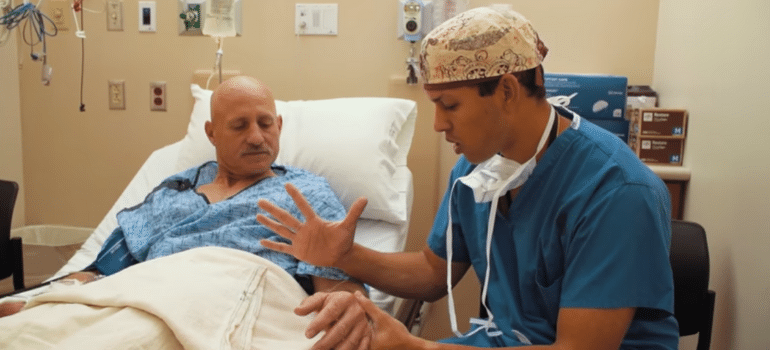Orthopedic Care
Want to learn more about this at Kettering Health?
Carpal tunnel syndrome, a chronic numbness or tingling in the hand and wrist, is one of the most common nerve disorders. The disorder affects anywhere between 4 and 10 million Americans. The carpal tunnel is a canal in the wrist, made of a valley of small bones and a ligament running between the two peaks.
For some people, the ligament is thickened and compresses the nerve canal. That compression can interfere with hand strength and sensation and limit hand function. While the condition is primarily associated with repetitive stress injury, such as using a computer keyboard, research shows it predominantly occurs in those with a genetic predisposition to the condition.
Your doctor can diagnose the syndrome by your medical history and a physical exam, which can be a simple tapping on the nerve in the area of the tunnel to see if it causes the tingling in the fingers.
“There is no definite test for carpal tunnel syndrome, so diagnosis is generally based on the examination findings,” explained Adam Dann, DO, a hand surgeon with Kettering Health. “If the numbness and tingling symptoms are waking the patient from sleep, that’s a pretty good indicator. A neurologist or physiatrist also can perform a nerve conduction study, if necessary, to confirm the exam results.”
Why doctors recommend surgery
Once diagnosed, carpal tunnel treatment depends on the severity and how far the problem has progressed. “The conservative approach involves hand splints, physical therapy, and cortisone injections,” Dr. Dann said. “However, most of the time, injections are a good simulation of what surgery might achieve, but it’s temporary. If the patient has good results with injections, they’ll likely do well with surgery, which is a lasting solution.”
Surgical intervention is a shared decision between the doctor and the patient. The physician will lay out your options and explain the benefits of each. Surgery is really the only option to provide ongoing relief. Unlike some other conditions, surgery is more effective the sooner its performed.
“Sometimes surgery is the last resort to treat a chronic condition,” Dr. Dann said. “But in this case, the longer you wait, the more muscle loss takes place, and that will be permanent. So, we tend to lean more towards a surgical release of the nerve because, if you wait too long, even surgery can’t help.”
How the surgery works
Carpal tunnel surgery is only mildly invasive. A surgeon can perform the procedure in a physician’s office with local anesthetic. The doctor makes a small incision in the palm and opens the tunnel by cutting the ligament down the middle. The incision releases the pressure on the nerve. An endoscopic procedure in the operating room is also an option.
Once the leaflets of the ligament open up, there’s more space for the nerve. Essentially the surgeon opens the “roof” of the tunnel allowing more space for the nerve and relieving pressure on the nerve. Another version of the surgery, called Sonex, works similarly, but it uses ultrasound to guide the surgeon releasing the ligament under the skin. Both procedures achieve the same result.
One scenario where surgery may not be as successful is when the patient has waited too long, and the nerve is too badly damaged. In these cases, there is dense numbness and atrophy of the muscle. You can still release the nerve, but there has been too much damage done for it to return to normal.
“Imagine having a car parked on a garden water hose for a long time,” explained Dr. Dann. “If you just run over it a few times, it will bounce back and be round again. But if the car sits on it for a long period of time, it’s permanently collapsed. Water can no longer flow through it. The damage is permanent—that’s similar to how the nerve works.”
If you’re waking up at night and your fingers are numb or tingling, or your hands fall asleep on the steering wheel while driving, you may be experiencing the effects of carpal tunnel syndrome. The nerve is telling you there is a problem, and it is time to see a doctor.









